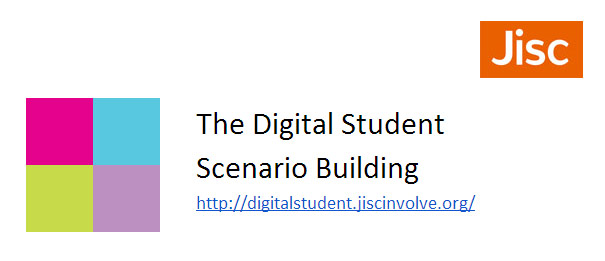I had the opportunity to kick-off the consultation phase of the project by running a workshop session at the ‘Supporting Educational Innovation, Partnership & Change’ event based at the University of Winchester.The session was unusual in a number of ways. Firstly, it was held in a local independent cinema. Secondly, about 40% of the participants were students. It’s the first time I’ve run an event in a cinema and with help from Sarah Knight and Sarah Davies of Jisc it went quite smoothly. The trickiest part was signalling to Sarah Davies in the projection box when I needed the slides to move-on. This process was described by her a ‘Like watching a silent movie’, presumably one with a very strange plot.
The consultation process is based on a scenario planning format developed by Helen Beetham in which participants are asked to imagine a possible world of the year 2020 and then describe how higher education is responding in the context of four digitally focused scenarios. The key strength of the scenarios that we are using is that they separate out thinking around institutions responding to ‘what students think they want’ and ‘what students need’. This is an attempt to avoid the assumption that meeting students’ expectations will automatically provide the best education or experience. Given that we only had around an hour for the session we weren’t expecting too much from the scenario planning but a number of themes did emerge. Overall most of the ‘worlds’ depicted were a simple extension of the present with more pervasive, and better integrated, technology. One alternative ‘world’ concept was based on the notion of an increased divide between those that have access to digital tech and those that don’t. One group framed this in terms of economic power, with the effect of the affluent having the most access to digital connectivity, communication and resources becoming stark. The two main themes that arose from the scenarios and the following discussion were around flexibility and increased student influence on quality and curriculum. In some senses these themes interrelate with many groups seeing technology as central to providing multiple ways for students to engage, for example:
“Education is adapted to every student’s own learning style (education is available in multi formats/styles)”
“More fluid curriculum- increased problem based learning focus” “Staff will be available online. – Lectures available online”
The challenge of managing high levels of pedagogical tailoring at scale and the manner in which this might be in tension with notions of consistency of experience and quality were also discussed. Overall there was a sense that the technology already provides us with levels of potential flexibility that we are not institutionally (or perhaps humanly?) capable of taking advantage of. The desire for face-to-face interaction was also raised in more than one scenario. I suspect this was driven by the student participants who, to my mind, seemed to think that some face-to-face contact was important and perhaps was part of what made a learning experience authentic. This view may have been driven by the nature of the imagined future worlds in which technology appeared to be omnipresent. One group put forward the interesting idea that in 2020 face-to-face interactions would be a ‘marketed as a privilege’. Certainly authenticity was something that was considered by a few groups:
“…courses [to be] more aligned with current issues and the real world.”
“…students’ will form their own no-boundaries web based institutions with accreditation based on measured real world impact of their knowledge. All traditionally closed resources will be pirated and made freely available for all”
As I mentioned the session was undertaken at high speed and so we can’t draw strong conclusions from it. However, it did demonstrate the value of the scenario planning process and we will be keeping a close eye on the themes emerging in our future events to see if they chime with our cinema based session in Winchester. Our next event will take place on the 4th March in London and is open to everyone with an interest in the area. We will be running an extended version of the scenario planning and asking for feedback and advice around the findings from phase 1 of the project.


One reply on “Cinematic scenarios”
Thank you – this looks like it was a really interesting day. The sentence that stood out for me was “Overall most of the ‘worlds’ depicted were a simple extension of the present with more pervasive, and better integrated, technology.” which chimes with even current technologies – the technologies make new actions, etc. possible, but at the end of the day, many human needs, desires, and communications remain the same. I am coming from a perspective of wanting to be master of the technology, rather than a slave …